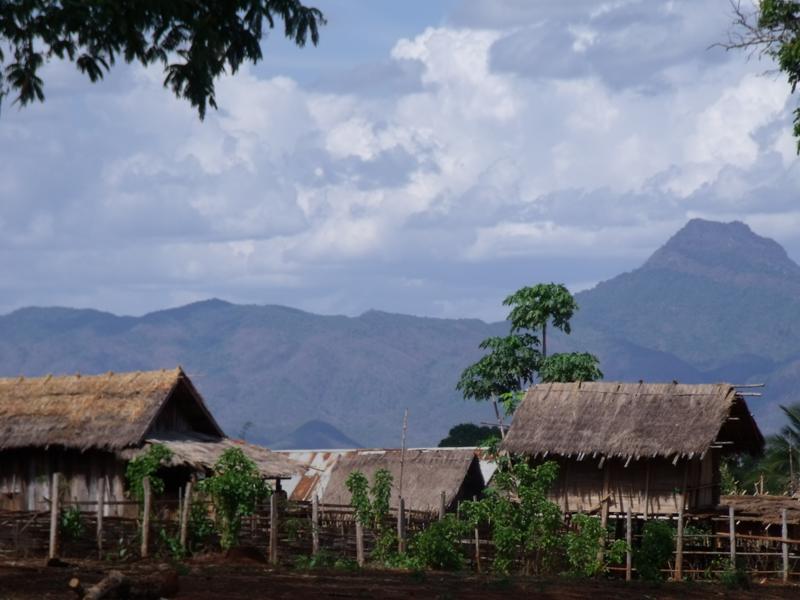Maw Kayah, climbs the mountain path from Loikaw to Phruso Township, in Kayah State, carrying her belongings in a back pack, her wide-brimmed hat sheltering her from the sun...
Maw Kayah, climbs the mountain path from Loikaw to Phruso Township, in Kayah State, carrying her belongings in a back pack, her wide-brimmed hat sheltering her from the sun.
 The twenty year–old community development worker walks for half a day before reaching a tiny rural hamlet of twenty houses, which is home to one hundred people. The village cannot be named to protect the safety of the residents.
The twenty year–old community development worker walks for half a day before reaching a tiny rural hamlet of twenty houses, which is home to one hundred people. The village cannot be named to protect the safety of the residents.
Along the path she listens to Kayah traditional songs on a tiny AM/FM radio she carries in her hand.
The village is located inside the disputed area patrolled by both the Burmese military and the Karenni National Progressive Party (KNPP) armed rebel group.
The village has no well, so villagers have to carry water from a creek a mile and a half away.
The military junta has not permitted local NGOs and other social organizations to go the area. However, Maw Kayah, a Buddhist youth worker is allowed to enter and do social work and education in health and life skills.
Before that, she heard many people in rural Kayah State faced many difficulties and human rights abuses. Many communities, like Phruso, are in need of development.
“When I saw their situation, I felt so upset,” she said.
“They are very poor. They don’t have much education,” Maw Kayah said.
She was very discouraged by the political situation at first, because the military government would not allow social workers to go rural areas to do community development.
 However, she was inspired to continue her work by a Kayah song.
However, she was inspired to continue her work by a Kayah song.
She told BNI the Kayah song, “Et Kyu Et Ray” (We Must Help Ourselves), written by U Htay Reh in 1986 and sung by Maw Bu Myar, encouraged her when she really needed it.
“All we brothers and sisters have to live in unity,” the lyrics say.
“Our young people have to work for development of our community. If we work hard for our community, we will see positive change.”
“These words touched my heart,” she said.
“When I go to the project site, I listen to the song,” she said.
She sometimes sings this song together with the villagers.
Maw Kayah said this song encourages Kayah youth to work for their communities with a sense of responsibility. She said music is a good tool to persuade youths to be active in sustainable community development.
 She believes song writers and singers are also working to build strong communities for Kayah people by strengthening Kayah traditional values and encouraging the people to work together for the common good.
She believes song writers and singers are also working to build strong communities for Kayah people by strengthening Kayah traditional values and encouraging the people to work together for the common good.
Kayah song writer, Sayar Khu Reh, agrees with her. He said in an interview, “The aim of writing Kayah songs is to highlight the situation in Kayah State, to let all ethnic people know about the real situation of in our area, as well as to encourage the people to work for unity and community development.”
She used to live in the town, but she was not very interested in social work at that time.
However, since she began to understand the plight of the villagers and to work among them, she has gained their love and respect.
“We need mutual understanding. We have to live harmony with local people. It’s not an easy task. If something is wrong, we could be in danger. The current political situation is very complicated. We are investing our lives,” Maw Kayah said.
 “I am happy and feel better when I live in the development project village. I want to work hard and try my best for community development with these villagers even though we have many difficulties,” she said.
“I am happy and feel better when I live in the development project village. I want to work hard and try my best for community development with these villagers even though we have many difficulties,” she said.
Currently, she lives together with villagers again in the development project where there is no electricity, no cinema, and no internet access. She can only get information from the outside world through Radio.
She still listens to the Kayah songs which are broadcast from Naypyitaw on FM radio because they continue to encourage her and strengthen her resolve to work for the welfare of her people by building strong communities.



